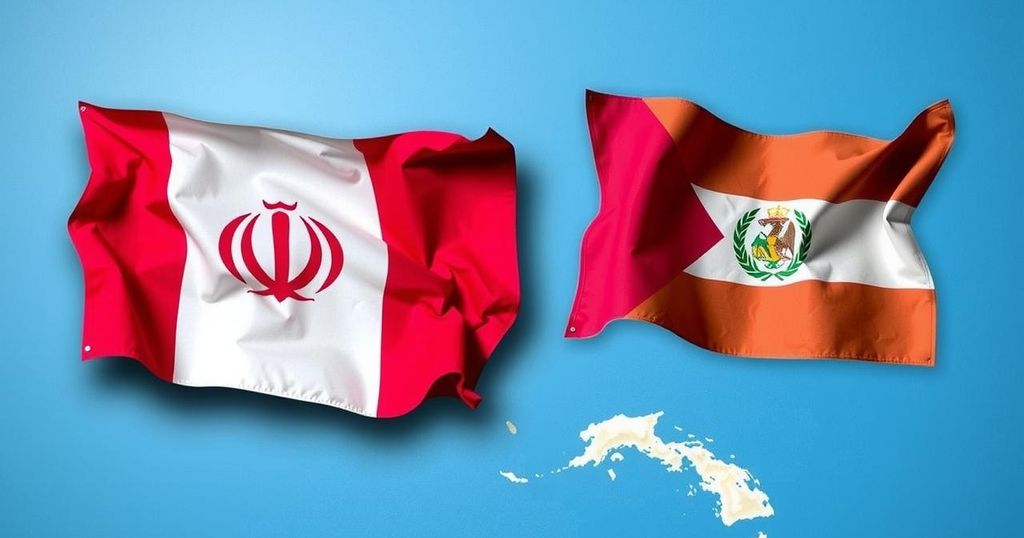Iran has pledged support to Canada, Panama, Mexico, and Greenland against U.S. ‘aggression’ as President Trump threatens to seize strategic territories. Trump’s rhetoric and suggestions—such as renaming the Gulf of Mexico—have drawn criticism and concern from other nations, while his team defends policies as vital for U.S. national security. Responses from affected nations reflect rising tensions and a call for sovereignty.
Iran has expressed its commitment to support Canada, Panama, Mexico, and Greenland in response to perceived aggression from the United States under incoming President Donald Trump. Amid threats to potentially seize the Panama Canal and Greenland, Trump has articulated plans to exert economic pressure on Canada, with intentions that some interpret as a bid to make it the 51st state. In a recent post from an official Iranian military social media account, Iran reaffirmed its readiness to defend these nations against U.S. hostility, stating, “Just as we have always stood ready to support other nations, Iran is prepared to assist Canada, Mexico, Panama, and Greenland against U.S. aggression and terrorism.”
Trump has further aggravated relations by suggesting a new imperialist agenda, remarking on the significance of eliminating borders that he views as artificially drawn. Experts warn that his rhetoric may embolden global powers such as Russia and China to pursue their own expansionist ambitions. John Bolton, former National Security Adviser, commented, “If I’m Vladimir Putin or Xi Jinping, this is music to my ears.”
Further inflaming tensions, Trump proposed renaming the Gulf of Mexico as the Gulf of America, a suggestion met with criticism from Mexican President Claudia Sheinbaum, who advocated for the region to be termed “América Mexicana.” Additionally, Trump’s ally Charlie Kirk has argued vehemently for U.S. control over Greenland, a position influenced by the territory’s strategic Arctic location and resources.
The Trump administration contends that its positions on Canada and the canal reflect legitimate national security interests. Karoline Leavitt, a spokesperson for the Transition team, stated, “Every decision President Trump makes is in the best interest of the United States and the American people.” In contrast, officials from Canada, Panama, and Denmark have pushed back forcefully against these notions. Dominic LeBlanc, Canada’s Finance Minister, declared, “The joke is over,” criticizing Trump for inciting confusion and chaos. Panama’s foreign minister emphasized the undeniable sovereignty of the Panama Canal, declaring it a significant and irreversible conquest.
In summary, Iran’s pledge of support for Canada and its allies against perceived U.S. aggression reflects growing international tensions as Trump formulates a controversial foreign policy agenda that is drawing widespread criticism from affected nations.
The article discusses escalating tensions between the United States and several countries, particularly Canada, Panama, Mexico, and Greenland, amidst contentious remarks from President Trump, who is known for his confrontational approach to foreign policy. Iran’s offer of support to these nations signifies a potential shift in alliances and reflects broader geopolitical concerns. The article highlights the implications of Trump’s proposals, which suggest a move toward increasing U.S. territorial ambitions and economic coercion, stirring backlash from the affected countries. The analysis includes perspectives on how such rhetoric may motivate other global powers to assert their interests more aggressively in the face of perceived U.S. dominance.
In conclusion, the article illustrates a complex interplay of international relations characterized by Trump’s unconventional and aggressive foreign policy stance. Iran’s pledge of support for Canada, Panama, Mexico, and Greenland serves as a counter to U.S. hostility, while domestic and foreign leaders express increasing alarm over the implications of Trump’s rhetoric. The reactions from Canada and Panama indicate a unified front against U.S. expansionist claims, highlighting the delicate balance of power that persists in contemporary geopolitics.
Original Source: www.themirror.com






